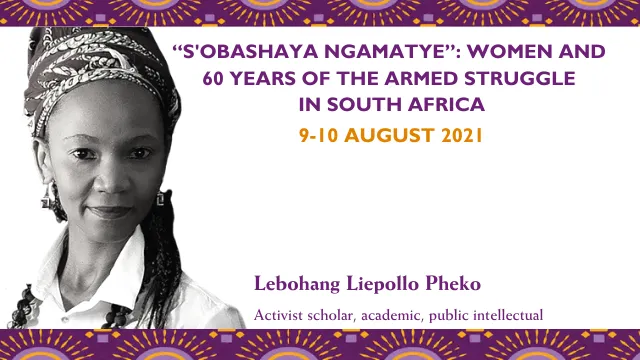
By Alungile Boqwana, School of Journalism and Media Studies student
Women's Day in South Africa marks the anniversary of the great women's march of 1956, where strong, confident, resilient and powerful women gathered at the Union buildings to protest against the carrying of passbooks.
This year, in honour of this landmark event, Rhodes University's Political and International Studies Department, Nelson Mandela University's Centre for Women and Gender Studies, and the University of Cape Town's Historical Studies Department brought together inspiring speakers for a two-day virtual colloquium.
The first panel, Chaired by Dr Babalawo Magoqwana, Director for the Centre for Women and Gender Studies at Nelson Mandela University, focused on women and the contours of the armed struggle.
Professor Saleem Badat, a former Vice-Chancellor of Rhodes University, spoke about political banishment under apartheid. He explained that there are two ways to understand 'banishment'. The first concept of banishment is the idea of the ‘middle passage’, which he described as "the metaphor for the suffering of people born of severe ties of longing for the homeland of a forced exile; it is a living and renting aspect of the history of the people of a diaspora".
The second concept that helps us to understand banishment is social death, which refers to slavery. "A slave was a person who did not belong to a society; had no social existence," he said. These banishments included women, especially those in the rural areas.
Lebohang Liepollo Pheko, an activist scholar, academic, public intellectual and development practitioner, started her presentation by thanking all the women that had paved the way for her, especially her mother, who was present at the Colloquium.
Pheko stated that the way African liberation is still written remains frustrating for many feminists and historians, since it fails to examine the extensive and complex layers of women's contributions. Many know that liberation history predominantly focuses on great heroes and prominent men and their conspicuous endeavours. She suggested that liberation memories must link various social contexts and political geographies and centre women who participated in the military struggle. “To include the unknown and the known, the unseen and the seen, the intangible and tangible," she said.
One of the critical things she argued for was memory excavation. “Not to counteract the history of great men but to present many great endeavours of women,” she explained.
She suggested that 9 August is reframed as a day of reckoning, resurrecting and of excavating women's anti-colonial struggles as part of the discourse of this country.
"There is a need to repoliticise the day, as it is misrepresented," she said. “It does not represent an assault on white capital.”
In finalising her presentation, Pheko concluded that women must excavate the memory of black women from the historical narrative.
The panel's third speaker was Professor Janet Cherry, a social activist and academic. Her presentation focused on the stories of three women who formed part of the National Liberation struggle including Nonyanga Elizabeth Sibanda, Nophithiphithi and Cikizwa Cina, with the latter two having passed away recently.
Prof Cherry emphasised her hope to draw some new understanding of women in the armed struggle and mass mobilisation.
The last speaker was Prof Debby Bonnin, who focused on political violence in Kwa-Zulu Natal in the 1980s and 1990s and how it divided the province. The political violence was intense and led to the killing and raping of women. "The violence became a part of everyday life," she said. “And women faced danger on all fronts.”
For more words from inspiring women and the others who participated in the two-day colloquium, please see recordings here: https://www.youtube.com/playlist?list=PLAztaQ4TBvjSMTxLsZ86nvVCioJemN9e6
